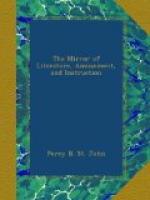* * * * *
A MIDNIGHT ADVENTURE.
The night was rather dark, and we had not seen the figure of our postilion, or even heard his voice; but we suspected, by the slowness of his movements, that he was some old crony of his master. On arriving towards the end of the relay, he began to blow a bugle with all his might, surprising us with a number of flourishes. Mr. Koch informed me that we were going to cross a small river, and that the blast with which we had been regaled was a warning for the bargeman. Our vehicle then stopped before the door of an inn, which stood on an elevated spot, and the postilion, alighting, asked Mr. Koch’s permission to enter the inn to drink a glass of brandy, whilst the bargeman answered his sign. It was midnight, and we expected soon to cross the river; but after waiting a quarter of an hour for his return, and seeing that the fellow did not come out, I alighted, and proceeded towards a window, where a light was perceivable. As I looked through it, I saw what I certainly did not expect, but what convinced me that the flourishes of his bugle were addressed to a very different person from the bargeman. Our postilion was sitting near a table, with a huge flagon beside him, and a wench on his knee. Provoked beyond expression at this unseasonable courtship, I shook the window till it flew open, and, before my companion had time to alight and witness the scene, both the hero and the heroine came to the door of the inn, the latter holding a lantern in her hand, by which I observed she was an ugly kitchen wench of about eighteen, and he a young man of five-and-twenty. Displeased with my interruption, he muttered something at my impatience, and at the unseasonableness of my call, and again blew his bugle, though by no means so vigorously as he had before done; after which we gained the barge, and continued our way without farther interruption.—Van Halen’s Narrative.
* * * * *
BARBARISM OF THE CAUCASIAN TRIBES.
Opposite to our encampment, on the other side of the Alazann, and at a distance of eighteen or twenty wersts, is the city of Belohakan, situated at the foot of the Caucasus, and inhabited by the Eingalos, a people whom the Lesghis keep in the most horrible state of slavery, and who formerly belonged to Georgia; but who being too industrious, and attached to their native soil, would never abandon it, during the different revolutions which that country has undergone, and became subject to their present masters. That city carries on a great trade with Teflis, principally in bourkas, which are manufactured there; and as the traders pass through Karakhach, our colonel, who was the commandant of this district, and from whom they must obtain a passport for Georgia, was obliged to have near him an Eingalo, who understood the Russian language, and




